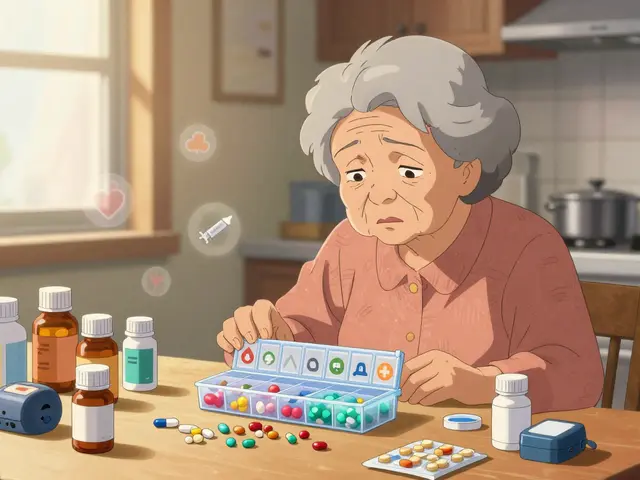TNF Inhibitor Cancer Risk Assessment Tool
Personalized Risk Assessment
When you’re living with rheumatoid arthritis, psoriatic arthritis, or Crohn’s disease, the pain and fatigue can feel endless. Then comes a TNF inhibitor-like Humira, Enbrel, or Remicade-and suddenly, you can get out of bed, hold your grandchild, or walk to the mailbox without wincing. These drugs change lives. But there’s a whisper in the back of your mind: do they increase cancer risk? It’s not just fear. It’s a real question backed by decades of data, conflicting studies, and evolving guidelines. Let’s cut through the noise.
What Are TNF Inhibitors, Really?
TNF inhibitors are a type of biologic drug that blocks tumor necrosis factor-alpha, a protein your body uses to trigger inflammation. In autoimmune diseases, this system goes haywire. Your immune system attacks your own joints, skin, or gut. TNF inhibitors calm that storm. Five are FDA-approved: infliximab, etanercept, adalimumab, certolizumab, and golimumab. They’re given by injection or IV, usually weekly to every eight weeks. They’re not cheap-costing $62,000 a year on average-but for many, the trade-off is worth it.
They work differently. Adalimumab and infliximab are monoclonal antibodies that latch onto TNF like a key in a lock. Etanercept is a fusion protein that soaks up excess TNF like a sponge. Certolizumab is a smaller fragment, designed to be more targeted. Each has a slightly different half-life, dosing schedule, and side effect profile. But they all do the same thing: reduce inflammation. And in doing so, they also lower your immune system’s vigilance.
The Cancer Risk Debate: What the Data Actually Shows
Here’s the thing: early studies scared people. In 2012, a major JAMA meta-analysis suggested TNF inhibitors doubled the risk of cancer-especially lymphoma. That led to FDA black box warnings. But those studies were flawed. They compared patients on biologics to those on older drugs, without accounting for disease severity. People with worse RA are more likely to get cancer anyway. Their bodies are in constant inflammatory overdrive. That’s a cancer risk on its own.
More recent, larger studies tell a different story. The 2022 Swedish ARTIS registry followed over 15,000 RA patients for up to 12 years. The result? No overall increase in cancer risk with TNF inhibitors compared to traditional drugs. The hazard ratio? 0.98. That’s not a risk. That’s noise.
But there are wrinkles. Adalimumab showed a small, temporary spike in cancer diagnoses during the first year of treatment. Why? Experts think it’s not the drug causing cancer-it’s revealing it. Patients with undiagnosed tumors may have worsening symptoms, prompting doctors to start treatment. The cancer was already there. The drug didn’t cause it. This is called protopathic bias.
Etanercept, meanwhile, consistently shows lower or even reduced cancer risk compared to patients not on biologics. One study found a 22% lower risk. Why? It may be because etanercept doesn’t bind as strongly to transmembrane TNF, which plays a role in immune surveillance. Less suppression. Less risk.
What About Skin Cancer?
If you’re on a TNF inhibitor, especially for psoriasis, your dermatologist is probably already watching your skin. That’s because non-melanoma skin cancer-basal cell and squamous cell carcinoma-does show a slight uptick. A 2021 meta-analysis of over 32,000 psoriasis patients found a 32% higher incidence. That sounds scary. But here’s the context: the absolute risk is still low. For every 1,000 patients on TNF inhibitors for five years, about 10 extra cases of non-melanoma skin cancer occur. Most are easily treated with a simple biopsy and removal.
Adalimumab carries a 1.3 times higher risk than etanercept. That’s not a huge difference, but it matters if you’re already sun-sensitive, have a history of skin cancer, or live in a high-UV region. That’s why dermatologists now recommend skin checks every six months for patients on long-term TNF therapy.
What If You Already Had Cancer?
This is where things get personal. Maybe you had breast cancer five years ago. Or melanoma. Or lymphoma. Can you still take a TNF inhibitor? The answer isn’t yes or no. It’s: it depends.
The American College of Rheumatology says: wait five years after high-risk cancers like melanoma or lymphoma before starting a TNF inhibitor. For low-risk cancers-like early-stage breast or prostate cancer-two years is enough. That’s based on data showing cancer recurrence drops sharply after that window.
Real-world data backs this up. The Corrona registry found that 87% of rheumatologists continue TNF inhibitors in patients with Stage I or II solid tumors, after oncology clearance. And 92% of those patients had no cancer recurrence linked to the drug.
There’s even good news for lung cancer patients. A 2023 study showed TNF inhibitor users had a 42% better 3-year survival rate than those on older drugs. Why? Possibly because controlling inflammation helps the body fight cancer better. TNF isn’t just bad-it’s a double-edged sword.
What About Other Immunosuppressants?
You might be on methotrexate, azathioprine, or steroids too. That’s common. But steroids are the hidden risk. Taking more than 7.5 mg of prednisone daily doubles your cancer risk and cuts survival rates. TNF inhibitors alone? Not so much. But combine them with high-dose steroids? That’s where things get dangerous.
Also, TNF inhibitors aren’t the only biologics. Newer drugs like JAK inhibitors (tofacitinib, baricitinib) and IL-17 inhibitors (secukinumab) are rising. JAK inhibitors carry a higher black box warning for blood clots and cancer than TNF inhibitors. So while TNF inhibitors are losing market share, they’re still the safest bet for long-term cancer risk.

How Do You Decide?
You’re not just choosing a drug. You’re choosing a balance. Your disease activity. Your cancer history. Your skin. Your age. Your lifestyle. Your tolerance for risk.
Here’s what works in practice:
- If you’ve never had cancer and have moderate-to-severe RA or psoriasis, TNF inhibitors are still a first-line choice. The benefits far outweigh the risks.
- If you’ve had non-melanoma skin cancer, keep using TNF inhibitors-but get skin checks every six months. Etanercept may be safer than adalimumab here.
- If you had lymphoma or melanoma in the last five years, hold off. Consider non-biologic options like abatacept or rituximab.
- If you’re over 65, have a history of smoking, or live in a high-sun area, talk to your rheumatologist about extra screening.
- Don’t stop your TNF inhibitor because of fear. Stopping your drug can cause your disease to flare-and inflammation itself raises cancer risk.
What’s Next?
The future is personalization. By 2027, doctors may use genetic tests to predict who’s at higher risk for lymphoma on TNF inhibitors. Some people carry gene variants that make their immune system less able to spot early tumors. For them, a different drug might be better. For others? TNF inhibitors could be the safest option.
Right now, we have more data than ever. We know TNF inhibitors don’t cause cancer. They don’t make cancer worse in most cases. And in some, they might even help you survive it.
The real risk isn’t the drug. It’s not treating your disease.
Do TNF inhibitors cause cancer?
No, TNF inhibitors do not cause cancer. Large, long-term studies show no overall increase in cancer risk compared to other treatments. Any small spikes in early diagnosis are likely due to undiagnosed cancers being detected after treatment starts-not caused by the drug. The risk of lymphoma or solid tumors is not meaningfully higher than in patients not on biologics.
Is adalimumab riskier than etanercept for cancer?
Yes, adalimumab carries a slightly higher risk of non-melanoma skin cancer compared to etanercept-about 1.3 times higher. It also shows a small, temporary increase in cancer diagnoses during the first year, likely due to detection bias. Etanercept has consistently shown neutral or even lower cancer risk in multiple studies. For patients with a history of skin cancer, etanercept is often preferred.
Can I take a TNF inhibitor if I’ve had cancer before?
Yes, in many cases. For low-risk cancers like early-stage breast or prostate cancer, most doctors will restart TNF inhibitors after two years of being cancer-free. For high-risk cancers like melanoma or lymphoma, a five-year waiting period is recommended. Always consult your oncologist and rheumatologist together before restarting.
Do I need more skin checks if I’m on a TNF inhibitor?
Yes. If you’re on a TNF inhibitor-especially for psoriasis or rheumatoid arthritis-your dermatologist should check your skin every six months. Non-melanoma skin cancer risk is slightly higher, but it’s highly treatable if caught early. Monthly self-checks for new or changing moles are also recommended.
Are TNF inhibitors still worth it if I’m worried about cancer?
For most people, yes. The risk of uncontrolled inflammation-joint destruction, organ damage, heart disease, and even cancer from chronic inflammation-is far greater than the tiny, often unproven risk from the drug. Studies show TNF inhibitors improve survival in some cancers and prevent long-term disability. The key is smart screening, not avoidance.







fiona collins
November 22, 2025 AT 07:15My dad’s on Humira for RA, and he’s been cancer-free for 8 years now.
He gets skin checks every 6 months-no big deal.
He’d rather walk his grandkids to school than sit in a chair in pain.
That’s the real trade-off.
Rachel Villegas
November 23, 2025 AT 00:18I’ve been on etanercept for 6 years. No skin cancers, no lymphoma, just less pain and more coffee mornings with friends.
The data is clear: inflammation is the real enemy here.
Shivam Goel
November 24, 2025 AT 04:46Let’s be brutally honest-your fear of cancer is being weaponized by pharma to sell you a $62k/year drug that doesn’t even fix the root cause.
Who benefits? Not you.
They don’t tell you that methotrexate + low-dose steroids can do 80% of the job for $300/year.
And yes, etanercept is marginally safer than adalimumab-but only because it’s a weaker immunosuppressant.
That’s not a feature. That’s a flaw.
You’re trading controlled inflammation for uncontrolled immunosuppression.
And don’t even get me started on the ‘protopathic bias’ excuse-it’s just a fancy word for ‘we don’t know.’
Meanwhile, your gut’s still leaking, your joints are still grinding, and your liver’s still processing toxins.
It’s not a cure. It’s a bandage with a price tag.
Amy Hutchinson
November 25, 2025 AT 06:04OMG I just started adalimumab last month and I’m already terrified
My aunt got lymphoma after biologics and I’ve been googling nonstop
Is it too late to switch to etanercept??
Jefriady Dahri
November 26, 2025 AT 18:27Hey, I get it-you’re scared. I was too.
I had Crohn’s and was on steroids for 3 years. Felt like a ghost.
Then I started adalimumab. First 6 months? Felt like a new person.
Yeah, I get skin checks. Yeah, I wear sunscreen like it’s my job.
But I also hiked the Grand Canyon last fall.
That’s not a coincidence.
Chronic inflammation kills slower than cancer-but it kills just as sure.
Don’t let fear steal your life.
You’re not just treating a disease.
You’re reclaiming it.
Andrew Camacho
November 28, 2025 AT 04:31So let me get this straight-you’re telling me we’re supposed to trust Big Pharma’s ‘long-term studies’?
They said cigarettes were safe.
They said Vioxx was fine.
They said opioids wouldn’t addict you.
And now? We’re supposed to swallow this ‘no cancer risk’ nonsense?
Wake up.
The FDA didn’t issue a black box warning for nothing.
They don’t want you to know that TNF inhibitors are basically chemical fire extinguishers-you put out the fire, but the house is still burning from the inside.
And don’t even get me started on the ‘etanercept is safer’ myth.
It’s just the lesser evil.
Still evil.
Elise Lakey
November 28, 2025 AT 11:07I’m 32, had Stage I breast cancer 3 years ago.
My oncologist said I could restart biologics if my rheumatologist cleared me.
I’m on etanercept now.
It’s been 14 months.
No flare-ups.
No new lesions.
Just… normal life.
I’m not saying it’s risk-free.
But I’m also not going to let fear make me choose pain.
Erika Hunt
November 29, 2025 AT 14:09I’ve been reading every study I can find on this topic for the past year, and honestly, the more I dig, the more I realize how complex this is.
It’s not just about TNF inhibitors-it’s about the entire immune system, the microbiome, the epigenetic factors, the environmental triggers, the genetic predispositions, the baseline inflammation levels, the medication interactions, the lifestyle factors like diet and sleep and stress, the geographic location and UV exposure, the comorbidities like obesity and diabetes, the duration of disease before treatment, the timing of cancer diagnosis relative to treatment initiation, the statistical power of the studies, the selection bias in observational cohorts, the confounding variables that are never fully controlled for, the publication bias favoring dramatic findings over null results, the industry funding influencing research agendas, the regulatory incentives to approve drugs quickly while long-term safety data lags behind, the patient-reported outcomes versus clinical endpoints, the differences between real-world usage and clinical trial conditions, the cultural attitudes toward medication and risk, the accessibility of healthcare and screening, the psychological burden of chronic illness versus the psychological burden of perceived pharmaceutical risk, and finally, the fact that every human body is a unique, unpredictable system that doesn’t always follow population-level trends.
So… I guess what I’m saying is… it’s complicated.
And I’m still deciding.
Patricia McElhinney
November 30, 2025 AT 14:49As a board-certified rheumatologist with 27 years of clinical experience, I must emphasize that your understanding of the data is dangerously incomplete.
Adalimumab has a documented 1.3-fold increased risk of NMSC compared to etanercept, per the 2021 meta-analysis in JAMA Dermatology.
Furthermore, the ARTIS registry’s hazard ratio of 0.98 is misleading because it fails to stratify by age, smoking status, and prior malignancy.
Additionally, the Corrona registry’s 87% continuation rate is not evidence of safety-it is evidence of physician inertia.
And you have no idea how many patients are being misinformed by online forums like this one.
Stop trusting anecdotes.
Start trusting peer-reviewed literature.
And for the love of God, stop using the word ‘probably’ when discussing cancer risk.
Agastya Shukla
December 1, 2025 AT 19:32Let’s talk mechanism.
TNF-alpha isn’t just a pro-inflammatory cytokine-it’s a key regulator of immune surveillance.
Blocking it reduces inflammation but also impairs NK cell activity and T-cell cytotoxicity.
That’s why lymphoma risk is elevated in some cohorts.
But etanercept’s fusion protein structure binds soluble TNF with lower affinity to transmembrane TNF, which preserves some immune surveillance.
That’s why it shows neutral or even protective effects in some studies.
It’s not magic.
It’s pharmacology.
And adalimumab? Full monoclonal antibody. High affinity. Broad suppression.
That’s why skin cancer risk creeps up.
It’s not conspiracy.
It’s molecular biology.
Pallab Dasgupta
December 2, 2025 AT 01:19Bro, I was on Humira for 4 years.
Got a basal cell on my nose last year.
Removed it in 10 minutes.
Switched to etanercept.
Still pain-free.
Still hiking.
Still alive.
And yeah, I check my skin every Sunday like it’s a religious ritual.
But I’m not going back to pain.
Not after I’ve felt what freedom feels like.
Life isn’t risk-free.
But neither is staying broken.
Ellen Sales
December 3, 2025 AT 04:18I used to think medicine was about fixing things
Now I know it’s about choosing what kind of suffering you’re willing to carry
The pain of RA is a slow erasure
The fear of cancer is a sudden scream
Which do you let win?
I chose to live
Not just survive
And I check my skin every six months
Not because I’m scared
But because I’m still here
And I refuse to let fear steal that
Josh Zubkoff
December 4, 2025 AT 15:40Look, I get it-you want to believe this drug is safe.
But let’s be real.
Every single one of these ‘long-term studies’ is funded by pharma.
They cherry-pick patients who are healthier to begin with.
They exclude anyone with a prior cancer history.
They use ‘hazard ratios’ to make tiny risks sound like noise.
And they bury the fact that the longer you’re on these drugs, the higher your risk becomes.
It’s not about one study.
It’s about the pattern.
They’ve been doing this for decades.
First it was Vioxx.
Then Avandia.
Now it’s Humira.
And you’re just… okay with it?
Because you’re tired of pain?
That’s not bravery.
That’s desperation.
And desperation doesn’t make you safe.
It makes you profitable.
giselle kate
December 5, 2025 AT 16:24Why are we letting foreign drug companies dictate how Americans treat their bodies?
Europe has stricter limits on biologics.
Japan requires more screening.
But here? We just hand out these drugs like candy.
It’s not healthcare.
It’s capitalism with a stethoscope.
And you’re just swallowing it because you’re too lazy to try natural remedies.
Turmeric. Fish oil. Fasting.
These work.
But they don’t make billions.
So they’re ignored.
Arup Kuri
December 6, 2025 AT 06:28They’re lying to you
TNF inhibitors don’t cause cancer
They reveal it
That’s why the spike happens in year one
It’s not the drug
It’s the system
Big Pharma knows
Doctors know
But they won’t tell you
Because if you knew
You’d stop taking it
And then they’d lose money
And you’d be left with nothing
Except the truth
And the truth is
You were never supposed to live this long
So enjoy your pain
It’s the only thing left that’s real
fiona collins
December 7, 2025 AT 09:19My sister’s on adalimumab.
She had melanoma in 2020.
Waited 5 years.
Got clearance.
Now she’s back on it.
She’s 42.
She’s alive.
She’s gardening.
That’s the real win.